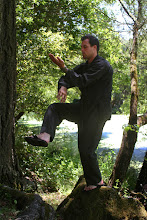Buddhist practice leads to a letting go that is more demanding than what ordinary life usually requires. Beyond relinquishing particular desires and opinions, we practice letting go of the underlying compulsion to cling to desires and opinions.This is not just letting go of outdated and inaccurate self-concepts; it also involves giving up a core conceit that causes us to cling to ideas of who we are or aren't. The practice of letting go is often mistrusted. One good reason being that without wisdom it is easy to let go of the wrong things.
Also it can suggest deprivation, weakness and personal diminishement. However, when someone is clinging to the past, it is not the past that needs to be abandoned, rather it is the clinging . The past may be a source of understanding. When there is no clinging to it, it is easier to learn the lessons the past provides. At times, it is important to understand the shortcomings of what we are clinging to before we are able to let go. Sometimes it is more important to understand the shortcomings of the grasping itself rather than the object of grasping. Grasping always hurts. It is the primary source of suffering. It limits how well we can see what is happening. When it is strong, clinging can cause us to lose touch with ourselves. It interferes with our ability to be flexible and creative and it can be a trigger for afflictive emotions. There is another side of letting go that we learn to let go into something valuable. From this side, letting go is more about what is gained than what is lost. When we let go of fear, it my also be possible to let go into a sense of safety or a sense of relaxation. Forsaking the need to be right or to have one's opinions justified can allow a person to settle into a feeling of peace.
By letting into something beneficial, it can be easier to let go of something harmful. At times, people don"t want to let go because they do not see the alternative as better than what they are holding on to . One of the nice things about letting go into something is that it has less to do with willing something or creating something than it does with allowing or relaxing. A wonderful result of letting go is to experience each moment as being enough, just as it is.
Buddhist practice leads to a letting go that is more demanding than what ordinary life usually requires. Beyond relinquishing particular desires and opinions, we practice letting go of the underlying compulsion to cling to desires and opinions.This is not just letting go of outdated and inaccurate self-concepts; it also involves giving up a core conceit that causes us to cling to ideas of who we are or aren't. The practice of letting go is often mistrusted. One good reason being that without wisdom it is easy to let go of the wrong things.
Also it can suggest deprivation, weakness and personal diminishement. However, when someone is clinging to the past, it is not the past that needs to be abandoned, rather it is the clinging . The past may be a source of understanding. When there is no clinging to it, it is easier to learn the lessons the past provides. At times, it is important to understand the shortcomings of what we are clinging to before we are able to let go. Sometimes it is more important to understand the shortcomings of the grasping itself rather than the object of grasping. Grasping always hurts. It is the primary source of suffering. It limits how well we can see what is happening. When it is strong, clinging can cause us to lose touch with ourselves. It interferes with our ability to be flexible and creative and it can be a trigger for afflictive emotions. There is another side of letting go that we learn to let go into something valuable. From this side, letting go is more about what is gained than what is lost. When we let go of fear, it my also be possible to let go into a sense of safety or a sense of relaxation. Forsaking the need to be right or to have one's opinions justified can allow a person to settle into a feeling of peace.
By letting into something beneficial, it can be easier to let go of something harmful. At times, people don"t want to let go because they do not see the alternative as better than what they are holding on to . One of the nice things about letting go into something is that it has less to do with willing something or creating something than it does with allowing or relaxing. A wonderful result of letting go is to experience each moment as being enough, just as it is.
Thursday, March 17, 2011
Subscribe to:
Comments (Atom)
